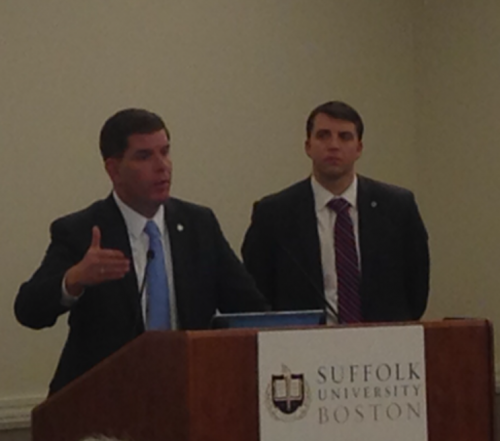When Boston was selected in January as the United States’ city to bid to host the 2024 Olympic Games, promised by Mayor Martin J. Walsh were a total of nine community meetings, giving the public and elected officials the opportunity to discuss their views, opinions, and initiatives. The first meeting was held at Suffolk University Law School Thursday.
“This is a conversation about what the Olympics could bring to the city of Boston,” said Walsh, who believes the community discussions are crucial for the city. “We’re working right now an actual proposal to the IOC to bid for the 2024 Olympics.”
David Manfredi, Founder and Principal of Elkus-Manfredi Architects, is a co-chair to the Master Planning Committee for 2024 Boston. Speaking to an audience that was flooding out the doors of the Law School, he discussed his bright visions for the games.
“We believe Boston is the right size city, and I think we all agree that Boston is a beautiful city, it’s a historic city,” Manfredi said.
As historic and beautiful as the city is, other Bostonians feel as if hosting the 2024 Olympic Games would be detrimental to its traditional topography.
Members of the group “#NoBoston2024,” handed out flyers before the discussion detailing the negative impacts of hosting the games.
“We are protesting against the use of public spaces for private exclusive events,” said a member of the group who did not want to share their name with a reporter.
At the top of that list is the abuse of parks, such as historical spaces and public spaces. Within the proposed physical plan for Olympics includes building the volleyball court in the Boston Common.
“This would damage the landscape, trees that are over 200 years old, and other damages would be irreparable,” the member said.
Manfredi believes, however, that the Common is an appropriate space for the Games.
“In many ways, Boston Common is our most cherished space. It’s a symbol of who we are as a city. We’ve proposed beach volleyball,” he said, causing immediate mixed reactions from the audience.
Hosting the Olympic Games means constructing not only venues, but managing the city’s infrastructure.
“When you begin think about venue planning, you start with where these things will fit. But that’s not really the right strategy,” Manfredi said. The right strategy, according to the co-chair, is where the city’s infrastructure is going, and plan into that.
The physical planning of the 2024 Olympics has been designed into two “clusters,” according to Manfredi, with 33 competition and non competition venues. There will be “28 of those 33 venues that are within a 10 kilometer radius,” making the Boston games the most walkable, transit-oriented games in history, Manfredi said.
Bringing the Olympics to Boston means helping speed up the improvement of infrastructure, including “public transportation and people driving in and out of the city,” Walsh said, referencing the major delays that occurred for the MBTA as a result of massive amounts of snowfall.
Walsh later gave examples of what bidding in the Olympics did for cities like New York and Chicago. In Brooklyn, he said, “There’s more building going on, manufacturing jobs, it was an opportunity for them to grow.” In Chicago, tourism and businesses also improved.
By bidding for the 2024 games, even if Boston does not get chosen, “it gives us the opportunity for the next two years to go around the world and market the city of Boston on what is great about our city,” Walsh said.
When asked to comment, a Fenway resident who wished to remain anonymous, described her concerns lie with “the financial impact of the games, the universities and the investments they make in their facilities, and improvements to facilities that the public may or may not have access to.”
While some Bostonians are longing for infrastructural improvements, the debate as to whether the Olympic Games is the best way to achieve said improvements remains up for discussion.

















